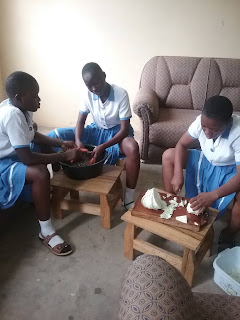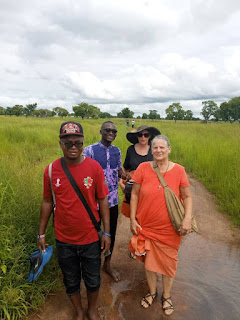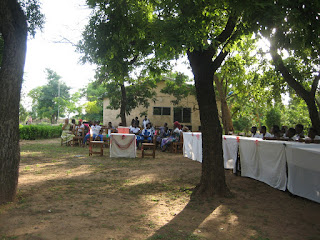In 7
short weeks, my first year in Ghana will have been completed. Hard to believe! So many new experiences; so many blessings
from God.
October
brought with it new neighbors! Francis,
Paulina, Anne and Nathan moved in to Mary Shaw’s bungalow next door.
It
is wonderful hearing the sound of young children laughing! Nathan bangs on our gate door, calling
“Granny, Granny, Granny”, when he wants to visit. The other day, he started calling me “Granny
Diane!” Very cool! We kick the soccer ball in the courtyard,
which always brings back great memories of kicking the ball with Joseph and
Paul in their young years.
October
also brought my 60th birthday, which fell on World Mission
Sunday. Saturday evening, Karen and the
girls planned a surprise birthday party for me, where all the girls sang to me
and we had jollof spaghetti and cake.
Sunday
morning, we travelled to Sawla to celebrate a special Diocesan Mass with Bishop
Peter Paul, where I was introduced to the packed church and specially prayed
for. Lunch with the Bishop and a number
of priests and religious was enjoyed.
We
closed out October, the Month of the Rosary, with a special Mass at the Grotto.
Francis
had some young men from the high school he teaches at come and dig us a garbage
pit. Anne had to jump in before any
garbage was dumped in!
SAGISS
was also blessed to receive some special American visitors. Carol Hofer and three of her friends, Dr.
Irene Allen, RoseAnn Morrow and Kari Green from Michigan, are with a group who
sponsor six girls’ education at SAGISS per year. They have been sponsoring the girl-child’s
education in northern Ghana for many years.
Carol taught at Damongo Senior High back in the 1970’s as a Peace Corps
volunteer. They educated the girls on
certain health and hygiene matters and gifted them with hygiene kits and
Rosaries. The girls greatly enjoyed
their visit, and welcomed them with some tribal dances. Karen and I had a great time visiting with
people from back home in the United States!
My
Food and Nutrition Form 1 class ended up with six girls.
The
teacher for the Form 3 Food & Nutrition class ended up transferring to
another school, so I picked up the Form 3 class to end the term. There are only 3 girls in that class. It isn’t easy picking up a class in the
middle of the term, but we are managing.
The girls are taking their end of Term exams and will be leaving for
Christmas vacation December 20th.
Karen
and I spent a weekend in November in Tamale to attend a Diaconate
Ordination. The ordination was beautiful
and inspiring. Seventeen men who will be
ordained priests in the next year came from both a Diocesan seminary and a
Divine Word Missionaries (SVD) seminary.
We celebrated with two young men from the Diocese of Damongo, Rev.
Maclean and Rev. Clement.
We
were excited to reunite with the SVD seminarians we spent the 12 day TICCS
Cultural program with a couple months earlier.
See previous blog.
The
weekend included a visit to a restaurant that served stone hearth baked
pizza! I hadn’t had pizza since I left
the United States, more than 10 months earlier.
I ordered the Hawaiian – pineapple and ham. It was totally delicious! I ate the WHOLE thing! So, so good!
Thanksgiving
came. I had to work that day. Karen cooked us baked chicken, mashed
potatoes and gravy, stuffing, pumpkin bread and apple crisp. We topped it off with some sweet red wine. It was tasty!
It was definitely not our typical Thanksgiving; missing our families
even more than we do typically. However,
it was a day of Thanks! I thanked God
for my family and their understanding and support for my mission, I thanked God
for the courage He provided me to follow His call to Ghana, and I thanked God
for the many graces and the mercy He has blessed me with.
The
Damongo Diocese WUCWO (World Union of Catholic Women Organization) Celebration was
November 29 – December 1. My boss,
Headmistress Madam Pauline, is the President of the Damongo Diocesan Council of
Catholic Women (DCCW), so I was involved in some of the preparations. She made sure Karen and I bought our CCW
“cloth” so we could wear the uniform with the women from the various parishes
that gathered for the weekend at the Unity Center. It was a special weekend, meeting women from
many villages. It was surprising to me
that the majority of them did not speak English. There was a lot of communication done simply
by sharing smiles and laughs with one another!
I
have been reflecting on my life here in Damongo and my relationship with God. The Liturgy here in Ghana is very lively and
upbeat. Throughout my life, I have
encountered a number of different types of liturgy. The church we attended as a family when the
children were growing up, (Church of St. Gerard Magella in Brooklyn Park) had a
liturgy supported by modern Christian music, including piano, guitars and drums
rather than an organ. For many years, I
loved the music in that church. I
listened to popular Christian artists on the radio and in music videos. It was uplifting and gave me a positive,
sunny disposition for the day. It fit where
I was in life and in my spirituality at the time. As the years went by, at some point, that
Church was not providing me with what I needed.
I needed quiet, reflective time before Mass – to pray and connect to
God, not people in the pews talking; I needed kneelers (which the church did
not have) during Consecration; I needed some solemnity, some reverence.
I
eventually found my way to the Cathedral of St. Paul, which gave me what I was
yearning for. The music took a 180°
turn. Suddenly, I was listening to
choral organ music. The Church was quiet
and peaceful. There were numerous side
chapels with kneelers. They offered two
daily Masses – one in the evening that worked perfectly in to my work schedule.
There was incense, kneeling and reverence. In time, I met many wonderful,
spiritual, like-minded people and enjoyed time with them doing various service
projects. I felt at home at the
Cathedral, it was like a family. But sometimes when we get too comfortable, God
decides it is time for something new.
When
God called me to mission, I was praying the following prayer: “I wish that all I have be Yours, and I put
it in Your hands: My soul, my eternal
salvation, my liberty, MY SPIRITUAL PROGRESS, my life my health, my family, my
possessions, my work, and whatever good deeds I can accomplish, so that You
will arrange these things according to your will.”
The
first time I said that prayer, I was actually scared to pray it. Could I actually trust God with all these
very important things? Could I give up
control? Could I accept God’s will in
these areas of my life, rather than my own desires? Was I praying for something I would later
regret? Would I be able to handle what
God decided to give me?
My
SPIRITUAL PROGRESS. Sometimes, I wonder
if I have progressed spiritually since coming to Ghana. I do
not doubt that by the time my three years is up, I will have grown closer to
God. I trust God has a plan and as long
as I trust Him, I will be closer to the person he created me to be. I really miss Eucharistic Adoration. It was such a blessing to be able to be in
the Blessed Sacrament Chapel with our Lord in the early morning hours – just
Him and me. I could talk to Him about
anything. I could feel His
presence.
Sometimes
I long for Eucharistic Adoration.
Sometimes I wonder how I could have given that up. It was such a blessing. So wonderful, I can’t even put it into
words. But then I remember the prayer –
I am putting my Spiritual Progress in God’s hands. I am trusting that God knows what He is doing
in my life. I know God loves me so much
that He wants only the BEST for me. He
wants me to know He loves me. Even
though I might not understand how or why certain things happen in life, I know
in the end it is all for my best. As
long as I let God be in charge of my eternal salvation, my liberty, my
spiritual progress, my life, my health, my family, my possessions, my work and
good deeds, then I know all will be fine.
God loves me and wants only the best for me. He can do so much better for me than I can
myself. I trust Him. I will continue to strive to turn over
control of my life to God, because “no eye has seen, no ear has heard, no heart
has conceived the things He has prepared for those who love Him”.
“Only
in God is satisfaction to be found….. I am allowing God to bring me the most
thrilling plan existing, one I cannot imagine……
The
adventure continues……




























































